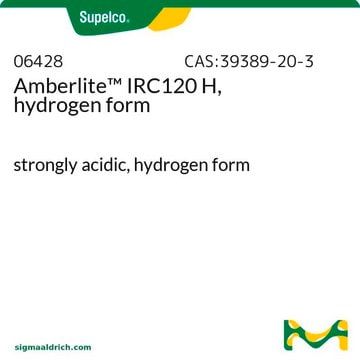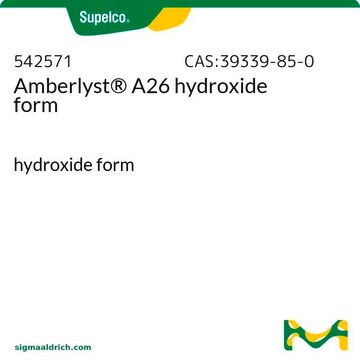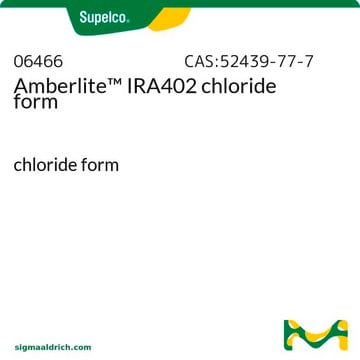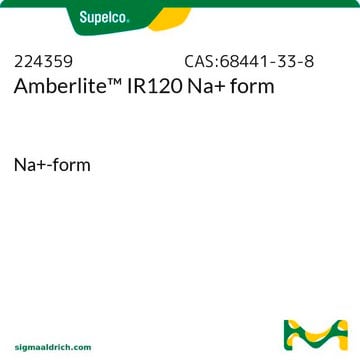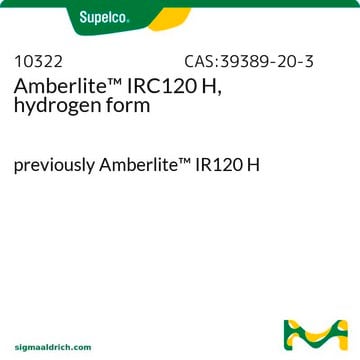10342
Amberlite™ IRN77 Wasserstoff-Form
Anmeldenzur Ansicht organisationsspezifischer und vertraglich vereinbarter Preise
Alle Fotos(1)
About This Item
UNSPSC-Code:
23151817
Empfohlene Produkte
Form
beads
Quervernetzung
8 % cross-linked
Verpackung
bucket of 500 g
Parameter
121 °C max. temp.
Feuchtigkeit
49-55%
Methode(n)
LPLC: suitable
Matrix
styrene-divinylbenzene (gel)
Aktive Matrixgruppe
SCX
Partikelgröße
600-700 μm
Betriebs-pH-Wert
0-14
Kapazität
1.9 meq/mL by wetted bed volume
Trenntechnik
cation exchange
Allgemeine Beschreibung
Amberlite™ IRN77 is a strong acid cation exchange resin.
Bei diesem Harz der Qualität nuclear grade liegen mindestens 95% der Ionentauschergruppen in der Hydroxidform vor.
Stark saurer Kationentauscher für die Wasserbehandlung, RAD-Abwasserbehandlung und Entgiftung.
Anwendung
Amberlite™ IRN77 was used as cation exchanger to determine the sorption activity towards Cs(I) and Sr(II) using isothermal titration calorimetry and solution-depletion methods.
Rechtliche Hinweise
Amberlite is a trademark of DuPont de Nemours, Inc.
Signalwort
Warning
H-Sätze
P-Sätze
Gefahreneinstufungen
Eye Irrit. 2
Lagerklassenschlüssel
10 - Combustible liquids
WGK
WGK 3
Flammpunkt (°F)
Not applicable
Flammpunkt (°C)
Not applicable
Persönliche Schutzausrüstung
Eyeshields, Gloves, type ABEK (EN14387) respirator filter
Choose from one of the most recent versions:
Besitzen Sie dieses Produkt bereits?
In der Dokumentenbibliothek finden Sie die Dokumentation zu den Produkten, die Sie kürzlich erworben haben.
Kyeong-Ho Yeon et al.
Water research, 38(7), 1911-1921 (2004-03-18)
This study investigated the production of high-purity water in the primary coolant of a nuclear power plant via the continuous electrodeionization (CEDI) process, using ion exchange resins as ion-conducting media between ion exchange membranes. The effectiveness of this method was
Benedicte Prelot et al.
Environmental science and pollution research international, 21(15), 9334-9343 (2014-04-15)
Sorption performance of cation-exchange resins Amberlite® IRN77 and Amberlite™ IRN9652 toward Cs(I) and Sr(II) has been tested in single-component aqueous solutions and simulated waste effluents containing other monovalent (Effluent 1) or divalent (Effluent 2) metal cations, as well as nitrate
Cristina Morales Torres et al.
Nature communications, 11(1), 1792-1792 (2020-04-15)
Continuous cancer growth is driven by subsets of self-renewing malignant cells. Targeting of uncontrolled self-renewal through inhibition of stem cell-related signaling pathways has proven challenging. Here, we show that cancer cells can be selectively deprived of self-renewal ability by interfering
Unser Team von Wissenschaftlern verfügt über Erfahrung in allen Forschungsbereichen einschließlich Life Science, Materialwissenschaften, chemischer Synthese, Chromatographie, Analytik und vielen mehr..
Setzen Sie sich mit dem technischen Dienst in Verbindung.
